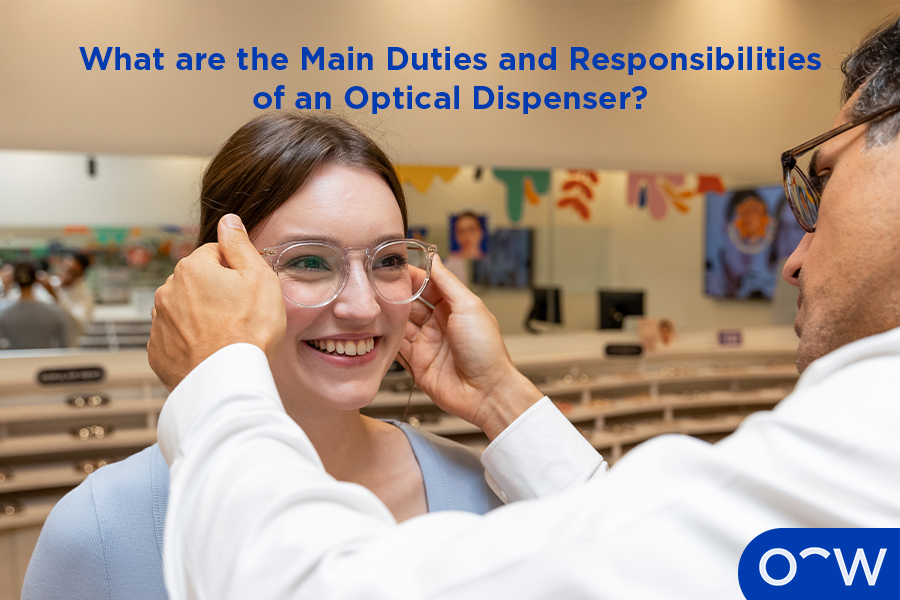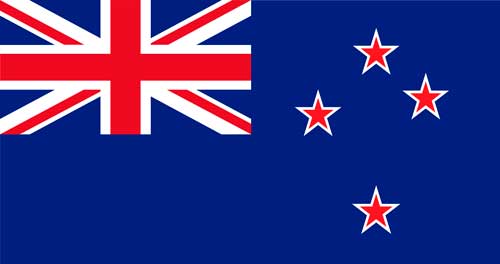What is an Optical Dispenser (Optician) and What Do They Do?
Published on March 26th, 2024
Updated on June 4th, 2025
 Australia
Australia When it comes to eye care, there is often a team of professionals who work together to make sure you are getting the best services possible. If you are getting a regular eye test, you will be more than familiar with an optometrist and what they do. If you have ever had a more serious eye problem, like advanced glaucoma or cataracts, you will be familiar with an ophthalmologist, also known as an eye surgeon.
If you have ever had glasses fitted, then you will have worked with an optical dispenser, although you may not have known it, as they often have a different name. In Australia, we have chosen to use the term optical dispenser instead of optician, as it is less likely to get confused with an optometrist.
Keep reading to find out more about optical dispensers, why we use this term in Australia and what role optical dispensers play in your eye care team.
What is an Optical Dispenser?
An optical dispenser is an eye care professional who is responsible for fitting and dispensing glasses. The term optician originated in the UK, where it relates to eye care professionals who both prescribe and dispense glasses.
As this definition is very closely related to optometry and is often confused with it, optician is not a term we use in Australia. We instead use the terms optometrists and optical dispensers to differentiate between those who perform eye exams and prescribe lenses (optometrists), and those who interpret prescriptions and assist customers with fitting their glasses (optical dispensers).


What Does an Optical Dispenser Do?
An optical dispenser has a range of responsibilities. These include fitting corrective lenses for patients, measuring the distance between a patient's pupils to ensure the best fit for glasses, and offering advice on selecting the right frames. Optical dispensers do not prescribe glasses or diagnose eye conditions.
Optical dispensers play an important role in helping an optometrist and ophthalmologist to meet patient needs and provide the appropriate treatments.
At Oscar Wylee, we have a dedicated and passionate team of eye care professionals in-store who can help with your vision needs. If you need an eye test, for instance, you can book online and our optometrists, optical dispensers and front of house staff will work together to sort out any prescriptions or eye care that you need.
What are the Main Duties and Responsibilities of an Optical Dispenser?
The main duties and responsibilities of an optical dispenser can include interpreting prescriptions, advising customers and fitting eyewear. The main duties and responsibilities of an optical dispenser are listed below.
- Interpreting Prescriptions: An optical dispenser’s responsibility can involve interpreting prescriptions, understanding the different abbreviations listed on the prescription and deciphering the numbers.
- Advising Customers: An optical dispenser’s role will also involve advising customers on the right eyewear and can provide suggestions for the best frame and lens options. They will help ensure the frame and lenses are fitted correctly.
- Fitting Eyewear: The optical dispenser typically helps with fitting eyewear by making any needed adjustments to your frames to ensure they feel comfortable and provide clear vision.


What Does an Optical Dispenser Do on a Daily Basis?
What an optical dispenser will do day to day is dependent upon the environment they work in. If they work in an optical dispensary, their responsibilities will include filling prescriptions, adjusting frames and lenses, and giving advice to patients. If they work at an optometrist's office, they will perform similar duties, but may work closely with an eye care team, including the optometrists. An optical dispenser may also work in other eye care centres or even laboratories.
What is the Role of an Optical Dispenser in Ophthalmic Dispensing?
The role of an optical dispenser in ophthalmic dispensing is to interpret prescriptions from optometrists or ophthalmologists and fit patients with suitable eyewear. Interpreting eye prescriptions typically includes looking at the abbreviations and numbers listed to understand what your vision needs. The role of an optical dispenser also includes helping customers select frames, measuring facial features, fitting and adjusting lenses, and ensuring visual and aesthetic suitability. An optician may also advise on lens types, coatings and general care.
What is the Difference Between an Optometrist and an Optical Dispenser
The difference between an optometrist and an optical dispenser is their qualifications and roles. An optometrist is trained to conduct eye tests, prescribe corrective glasses for refractive errors, and help monitor and manage refractive errors. An optical dispenser interprets prescriptions provided by the optometrist or ophthalmologist, fits and dispenses corrective lenses. The education and requirements for an optometrist include completing a degree from an accredited university and registering with the Optometry Board of Australia. Finally, as a requirement from the Optometry Board of Australia, graduates are to complete at least 20 hours of continuing professional development (CPD) every year to maintain registration, according to UNSW Sydney. The education and requirements for an optical dispenser typically include completing a certificate in optical dispensing, according to Seek.
How Do Optical Dispensers and Optometrists Work Together?
Optical dispensers and optometrists work together to help patients receive vision correction and ensure that their eyewear fits correctly and comfortably. The optometrist will examine your eyes and diagnose any potential eye issues. If you do have any eye problems, such as refractive errors, the optical dispenser will then take the prescription from the optometrist, interpret the different components listed. They then dispense the correct frames and lenses for your vision needs and can help you pick out the most suitable frames according to your face shape and vision requirements. While optometrists and optical dispensers are not eye doctors, they are both eye care professionals who can assist with eye care and eyewear concerns.
How to Become an Optical Dispenser?
To start a career as an optical dispenser, it might be helpful to find a job in the optometry industry. Some practical skills may be taught on the job, but an official certification will need to be attained to become an optical dispenser.
What are the Required Skills for a Career in Optical Dispensing?
The required skills for a career in optical dispensing may include having knowledge of eye health, how frames and lenses work, the ability to interpret prescriptions, customer service and teamwork. The required skills for a career in optical dispensing are listed below.
- Knowledge in eye health: Having knowledge in eye health is important as an optical dispenser, as it helps with accurately advising customers on selecting the correct frames and ensuring customer satisfaction.
- Knowing how frames and lenses work: Knowing how frames and lenses work so they can help provide proper and accurate assistance to customers with their prescription eyewear.
- Ability to interpret prescriptions: Having the ability to interpret prescriptions is one of the primary skills an optical dispenser needs to have in order to accurately dispense and fit prescription glasses.
- Customer service: An optical dispenser should have customer service skills as they often deal with customers directly on a daily basis. Having customer service skills can aid in creating a high-quality in-store experience for patients.
- Teamwork: Teamwork is an important skill to have as an optical dispenser, as they will often collaborate with the optometrist when delivering corrective eyewear for patients. Teamwork can increase efficiency and overall quality of the optometry service.
How Much Do Optical Dispensers Earn?
The average amount that optical dispensers earn can vary according to various factors. The factors that can affect how much optical dispensers earn can include experience, location qualifications, and the type of employer.
What do you Need to Study to Become an Optical Dispenser?
You will need to complete a course to become an optical dispenser. In Australia, the Australasian College of Optical Dispensing (ACOD) offers a Certificate IV in Optical Dispensing, which will provide you with the necessary qualifications. You could also complete the training via an institution like TAFE NSW, which offers the same certificate. This schooling and training is followed by a period of work experience or an apprenticeship to get hands-on knowledge.
How Long Does it Take to Become an Optical Dispenser?
To become an optical dispenser, it will take up to two years. The completion of a Certificate IV in Optical Dispensing, for instance, can take anywhere from 12 to 18 months. If you study part-time, it may take longer. You will then do the required work experience before entering the workplace as an optical dispenser.
Is an Optical Dispenser the Same as an Optician?
Yes, an optical dispenser is the same as an optician. An optical dispenser and an optician are eye care professionals who assist with interpreting prescriptions from the optometrist or ophthalmologist. Optician is the term more commonly used in Canada, while in Australia, while here in Australia, we use the term optical dispenser.
Can Optical Dispensers Diagnose Eye Conditions?
No, optical dispensers cannot diagnose eye conditions. Optical dispensers are only able to fit and dispense prescription lenses. Optometrists and ophthalmologists are eye care professionals who can examine and diagnose eye conditions such as low vision and more due to their education and training. Optical dispensers primarily help patients choose eyeglass frames and lenses by taking measurements of the client’s face to ensure they can produce the appropriate frame and lenses that are suitable for the client. Therefore, still making optical dispensers able to assist you with any of your eyewear concerns.
Read What is an Optical Dispenser (Optician) and What Do They Do? in other Oscar Wylee regions and their languages.
 Australia
Australia





